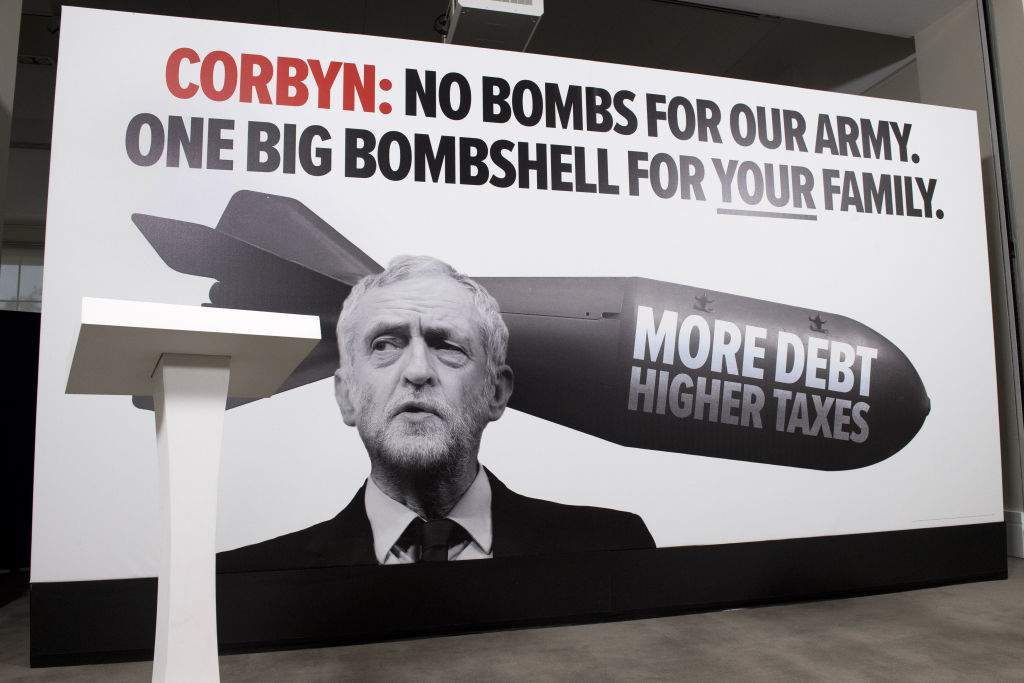What a curious election this is proving to be. It is hard to think of another general election in which the two largest political parties indulged in so much nonsense, nor did their best to persuade you that what is evidently true cannot possibly be true.
In the first place, the Conservative party asks you to believe the Labour party could yet finagle its way into Downing Street. You can’t afford to take a risk on Jeremy Corbyn, the Tories tell a public that has not the slightest intention of taking a risk, or anything else, on Jeremy Corbyn. Undaunted, the Tories warn: Look, there remains the prospect of a ‘coalition of chaos’ by which Corbyn could be put into Downing Street and kept there with the support of the SNP, the Liberal Democrats and anyone else daft enough to think Corbyn could be Prime Minister. There are very few such people in the United Kingdom.
But since the ‘coalition of chaos’ argument had some effect in 2015 it might work again in 2017. It is certainly worth trying even if its every deployment confirms the sense that the Conservative party is treating the electorate like mugs. Lock up your children, lest the Corbynistas come for them. Are you scared now? No, I didn’t think so.
Then we are asked to believe that every vote for Theresa May will strengthen her hand in the Brexit negotiations. It will, of course, do no such thing. To think it will you have to believe that Emmanuel Macron and Angela Merkel – assuming they win their own electoral contests this year – will take account of the size of Mrs May’s majority and conclude that their own interests have been changed by the fact that the Conservatives have thumping, rather than a narrow, majority. Only the truly credulous can maintain this fiction. Can anyone seriously think Mrs Merkel will tell Mrs May, ‘Well, I was going to give you a hard time but now you’ve crushed Jeremy Corbyn I appreciate that dog won’t hunt anymore’? Come on.
A whopping majority will indeed strengthen May but it will do so at home, not overseas, freeing her from the modest restraints the current parliamentary arithmetic imposes upon her and, most especially, giving her a freer hand with the House of Lords. You may think this a useful or even necessary development but past experience suggests there are grounds for thinking governments armed with mighty majorities cause as much, or indeed more, trouble than those forced to defend just a small majority.
Still, we are where we are and that’s on the brink of a colossal, if also largely undeserved, Tory victory. If Labour were twice as electable as they are this might indeed be an important election, one in which the arguments for or against this or that sort of Brexit might be the determining feature of the debate. This, it hardly needs saying, is not that sort of election.
For that would require an opposition party that had half a clue or even just a modicum of interest in actually becoming the next government. Jeremy Corbyn’s Labour party meets neither criterion. Which is why, again, we endure the sight of our politicians desperately trying to convince us of something we know, deep down, is not true. Namely, that this is a terrifically important election upon which the fate of the nation hangs.
We know Labour is not interested in victory because if it were it would not have elected Jeremy Corbyn leader. Nor would it have allowed an unrepentant Trot like John McDonnell to become Shadow Chancellor. Nor would it have asked us to believe in Foreign Secretary Thornberry or, ye gods, Home Secretary Abbott. But they have and we may draw our own conclusions from that.
Indeed, in a charming paradox, the only thing keeping Labour’s vote afloat at all is the realisation the party has no chance of forming the next government. In that sense, a vote for Labour can be thought a means by which the Labour party might yet be saved from itself. This is a delicate matter, for sure, requiring a calamitous defeat for Labour but one that’s not so calamitous that the party is ruined forever or handed to the Trots and Sods in perpetuity. Which, of course, is one and the same thing. This is the balance that needs to be struck: sensible Labour must be saved but Labour must also be so destroyed that even soft-headed but persuadable Corbynistas see the error of their ways. Well, good luck with that.
A vote for the Conservatives, on the other hand, while evidently sensible in terms of at least producing a functioning government, is also a vote for the Conservatives to indulge their own worst instincts which is, as ever, a delicious prospect to look forward to.
So there we have it. This election is the unbeatable versus the uninterested. An election, moreover, in which the unbeatable party pretends to persuade us the uninterested party is interested in power and the party uninterested in power pretends to persuade us the unbeatable party is beatable. Neither of these things is true and, like everyone else, you know this too. Happy times.







Comments